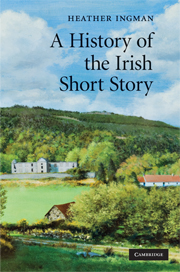Book contents
- Frontmatter
- Contents
- Acknowledgments
- 1 Introduction
- 2 The nineteenth century: nation and short story in the making
- 3 Fin de siècle visions: Irish short fiction at the turn of the century
- 4 The modern Irish short story: Moore and Joyce
- 5 1920–1939: years of transition
- 6 1940–1959: isolation
- 7 1960–1979: time, memory and imagination
- 8 1980 to the present: changing identities
- Notes
- Biographic glossary
- Bibliographic essay
- Index
2 - The nineteenth century: nation and short story in the making
Readings: William Carleton and Emily Lawless
Published online by Cambridge University Press: 04 August 2010
- Frontmatter
- Contents
- Acknowledgments
- 1 Introduction
- 2 The nineteenth century: nation and short story in the making
- 3 Fin de siècle visions: Irish short fiction at the turn of the century
- 4 The modern Irish short story: Moore and Joyce
- 5 1920–1939: years of transition
- 6 1940–1959: isolation
- 7 1960–1979: time, memory and imagination
- 8 1980 to the present: changing identities
- Notes
- Biographic glossary
- Bibliographic essay
- Index
Summary
If the modern Irish short story has frequently been concerned with identities in transition, it is interesting to observe that short narratives dealing with Irish themes began to emerge in the nineteenth century in large numbers at a time when the country was going through one of its most traumatic periods. The attempt by Irish Protestants to define themselves as a nation ended with the failure of Grattan's Parliament, and a series of events during the course of the nineteenth century, beginning with the Act of Union in 1800 and including Catholic emancipation (1829), the tithe wars, the famines and the 1848 rebellion, weakened the moral and political claim of the Ascendancy to rule Ireland. The tales of a writer like Sheridan Le Fanu reveal the anxiety induced by this loss of prestige. At the same time, the efforts of Catholics to establish a nation-state were beginning: in the 1820s Daniel O'Connell, aided by the Catholic Association, was orchestrating a mass movement to demand rights for the Catholic population. In order to make progress with this, O'Connell believed that Ireland needed to abandon the Irish language and learn the language of the country's administrators. Short fiction dealing with Irish themes started to proliferate at the moment when the Irish language and the oral tradition were being jettisoned in favour of English and the printed word. Research has highlighted the enormous implications of this shift from oral culture to print, not only for social structures, but also for patterns of thought.
- Type
- Chapter
- Information
- A History of the Irish Short Story , pp. 15 - 54Publisher: Cambridge University PressPrint publication year: 2009



